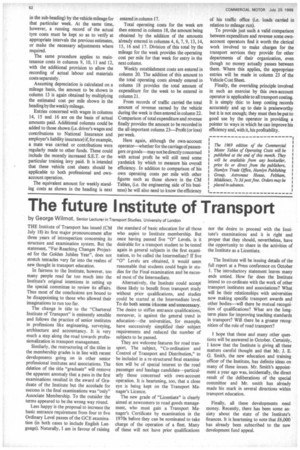The future Institute of Transport
Page 54

If you've noticed an error in this article please click here to report it so we can fix it.
by George Wilmot, Senior Lecturer in Transport Studies. University of London
THE Institute of Transport has issued (CM July 18) its first major pronouncement after three years of introspection concerning its structure and examination system. But the statement, "Far-Reaching Changes Projected for the Golden Jubilee Year", does not stretch tentacles very far into the realms of new thought in transport education.
In fairness to the Institute, however, too many people read far too much into the Institute's original intentions in setting up the special committee to review its affairs. Thus most of the conclusions are bound to be disappointing to those who allowed their imaginations to run too far.
The change in title to the "Chartered Institute of Transport" is eminently sensible and follows the practice of senior institutes in professions like engineering, surveying, architecture and accountancy. It is very much a step along the road towards professionalization in transport management.
Similarly, the restructuring of the titles in the membership grades is in line with recent developments going on in other senior professional institutes and associations. The deletion of the title "graduate" will remove the apparent anomaly that a pass in the first examinations resulted in the award of Graduate of the Institute but the accolade for success in the final examinations was "only" Associate Membership. To the outsider the terms appeared to be the wrong way round.
Less happy is the proposal to increase the basic entrance requirement from four to five Ordinary Level passes of the GCE examination (in both cases to include English Language). Naturally, I am in favour of raising
the standard of basic education for all those who aspire to Institute membership. But once having passed five "0" Levels, is it desirable for a transport student to be tested again in general subjects in the first examination, to be called the Intermediate? If five "0" Levels are obtained, it would seem reasonable that students could begin in studies for the Final examination and be excused most of the Intermediate.
Alternatively, the Institute could accept those likely to benefit from transport study without prior qualifications, and studies could be started at the Intermediate level. To do both seems irksome and unnecessary. The desire to stiffen entrance qualifications, moreover, is against the general trend in education—the universities, for example, have successively simplified their subject requirements and reduced the number of subjects to be passed.
They are welcome features for road transport. The subject, "Co-ordination and Control of Transport and Distribution," to be included in a re-structured final examination will be of special interest to the road passenger and haulage candidate—particularly those concerned with own-account operation. It is heartening, too, that a close eye is being kept on the Transport Manager's Licence.
The new grade of "Licentiate" is clearly aimed at newcomers to road goods management, who must gain a Transport Manager's Certificate by examination in the 1970s before they can be nominated to take charge of the operation of a fleet. Many of these will not have prior qualifications nor the desire to proceed with the Institute's examinations and it is right and proper that they should, nevertheless, have the opportunity to share in the activities of the Institute as a Licentiate.
The Institute will be issuing details of the full report at a Press conference on October I. The introductory statement leaves many ends untied. How far does the Institute intend to co-ordinate with the work of other transport institutes and associations? What will be their relationships with universities now making specific transport awards and other bodies—will there be mutual recognition of qualifications? What are the longterm plans for improving teaching standards in transport? Will there be a greater recognition of the role of road transport?
I hope that these and many other questions will be answered in October. Certainly, I know that the Institute is giving all these matters careful thought and that Mr. J. E. G. Smith, the new education and training officer of the Institute, has definite ideas on many of these issues. Mr. Smith's appointment a year ago was, incidentally, the direct result of the deliberations of the special committee and Mr. smith has already made his mark in several directions within transport education.
Finally, all these developments need money. Recently, there has been some anxiety about the state of the Institute's finances. It is heartening to note that £6,000 has already been subscribed to the new development fund appeal.
















































































































